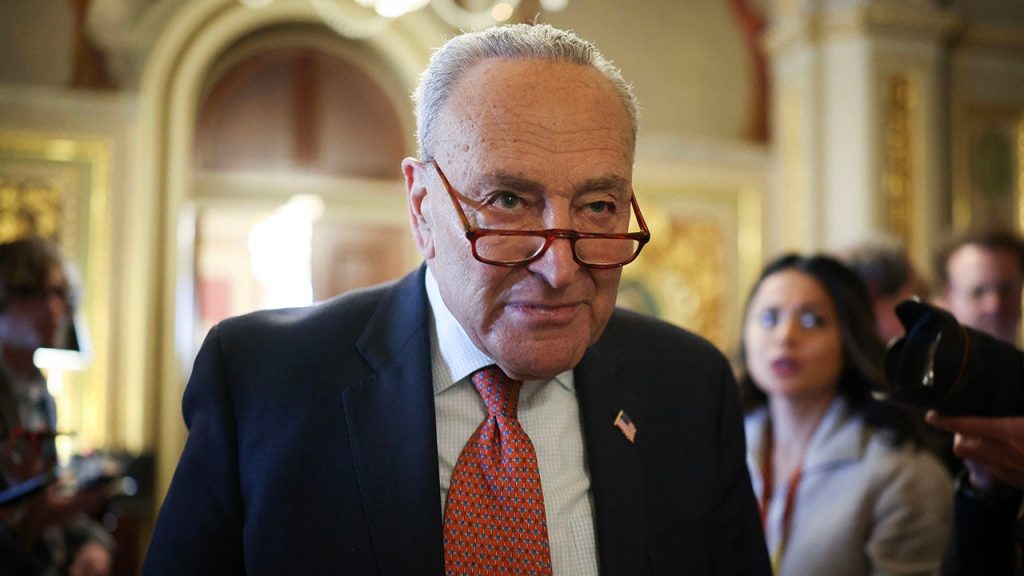Senate Minority Leader Chuck Schumer of New York is firmly holding onto his leadership post amidst increasing discord within the Democratic Party. As calls for his resignation intensify due to differing views on party strategy, particularly regarding the recent resolution to avert a government shutdown, Schumer has publicly defended his decision. He articulated the potential dangers of a government shutdown, illustrating his stance as essential for both his party and the country.
| Article Subheadings |
|---|
| 1) Schumer’s Refusal to Resign from Leadership |
| 2) The Controversy Over the Continuing Resolution |
| 3) Allegations Against the Trump Administration |
| 4) Internal Party Criticism and Challenges |
| 5) Schumer’s Vision for Future Democratic Strategy |
Schumer’s Refusal to Resign from Leadership
In a recent interview, Senate Minority Leader Chuck Schumer firmly stated, “Look, I’m not stepping down.” This declaration comes amidst rising tensions within the Democratic Party as they navigate internal disputes over their strategy and messaging in light of the challenging political landscape. The party has been facing difficulties in solidifying a cohesive approach to counteract the policies of President Donald Trump. Schumer’s decision to withstand the pressure highlights his commitment to his role, showing a willingness to confront both opposition and dissent within his own party.
The Controversy Over the Continuing Resolution
The primary source of contention arose from Schumer’s vote in favor of a Republican-sponsored continuing resolution, which was intended to prevent a government shutdown. This decision drew criticism from within his party, many of whom were opposed to the bill, seeing it as a concession to Republican demands. Schumer defended his choice by emphasizing the dire consequences of a government shutdown, indicating that it would grant the executive branch unchecked power in determining which government services remain operational. He articulated the importance of being pragmatic in the face of potential chaos, stating, “A shutdown would be 15 or 20 times worse,” and pointed to the risks associated with government operations and the well-being of the public.
Allegations Against the Trump Administration
Amid the debate surrounding the continuing resolution, Schumer alleged that if a government shutdown were to occur, it could lead to drastic cuts in essential programs such as the Supplemental Nutrition Assistance Program (SNAP) and Medicaid. He claimed that the administration could use the shutdown as an opportunity to pursue cuts that would heavily impact average Americans, stating, “They would eviscerate the federal government.” His warnings about the dangers posed by the Trump administration have been met with skepticism by some within his party, but he maintains his stance that the repercussions of a shutdown could severely undermine government functions and harm vulnerable populations.
Internal Party Criticism and Challenges
The choice to support the continuing resolution has not only drawn fire from party members but also sparked discussions about Schumer’s leadership effectiveness. Prominent figures, including Nancy Pelosi, have echoed concerns that Democratic concessions have not yielded tangible benefits. Rep. Alexandria Ocasio-Cortez has been particularly vocal, criticizing Schumer’s decisions and suggesting that he should consider the timing of his continued leadership. This internal pushback has created a landscape where Schumer must navigate the fine line between party unity and his leadership decisions amid ongoing pressures.
Schumer’s Vision for Future Democratic Strategy
Despite the criticisms, Schumer has articulated his vision for the Democratic Party’s strategy moving forward as it gears up to tackle the upcoming challenges posed by the 2024 elections. He emphasizes unity among Democrats to combat the Trump administration’s policies, asserting that there is a collective goal to demonstrate the shortcomings of Trump’s leadership. “Our goal is to make Donald Trump the quickest lame duck in modern history,” Schumer stated, underlining a strategic pivot towards a more aggressive campaign against the opposition. By outlining this vision, Schumer aims to refocus party efforts and rally support amongst Democrats, discouraging potential fragmentation that could hinder their political objectives.
| No. | Key Points |
|---|---|
| 1 | Senate Minority Leader Chuck Schumer refuses calls to resign amid increasing criticism from within the Democratic Party. |
| 2 | Schumer voted for a Republican-sponsored continuing resolution to prevent a government shutdown, causing internal party discord. |
| 3 | He argued that a government shutdown could lead to drastic cuts in essential services for Americans. |
| 4 | Notable Democratic figures, including Nancy Pelosi and Alexandria Ocasio-Cortez, have criticized his leadership and decision-making. |
| 5 | Schumer stresses the need for Democratic unity against President Donald Trump as they prepare for the next election cycle. |
Summary
In the wake of escalating conflict within the Democratic Party, Chuck Schumer remains steadfast in his role as Senate Minority Leader, despite tumultuous reactions to his decisions. His endorsement of a Republican continuing resolution illustrates the challenges leadership faces in balancing party unity and practical governance. As the Democratic Party navigates these internal divisions, the implications of Schumer’s actions will be critical in shaping their strategies leading into the upcoming elections.
Frequently Asked Questions
Question: Why is Schumer facing criticism from within his party?
Schumer is being criticized for his decision to support a Republican-sponsored continuing resolution, which many Democrats view as a concession to GOP demands, leading to discontent among party members.
Question: What potential consequences did Schumer warn about regarding the government shutdown?
Schumer warned that a government shutdown could lead to severe cuts in essential services like SNAP and Medicaid, which would disproportionately affect vulnerable populations.
Question: How does Schumer plan to unite the Democratic Party against Trump?
Schumer emphasizes the need for a cohesive Democratic strategy aimed at showcasing the failures of President Trump’s policies, encouraging party members to engage in aggressive opposition as they prepare for future elections.


